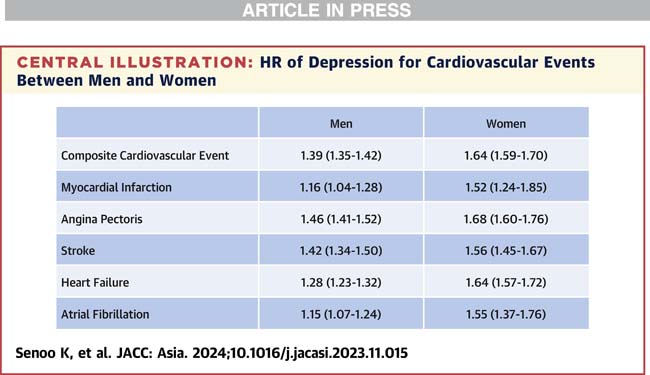People with depression face a higher risk of cardiovascular disease (CVD); however, more women than men experience cardiovascular disease after a depression diagnosis, according to a new study published in JACC: Asia. The study investigates the connection between depression and cardiovascular disease, shedding light on potential mechanisms that contribute to sex-based differences and emphasizing the importance of tailoring cardiovascular disease prevention and management strategies according to sex-specific factors.
Sex Differences in the Association Between Depression and Incident Cardiovascular Disease
Depression is a known risk factor for cardiovascular disease (CVD), but potential sex differences in this association remain unclear.
The goal of this study was to investigate the association between depression and subsequent cardiovascular events and explore possible sex differences.
We conducted a retrospective analysis using the JMDC (Japan) claims database from 2005 to 2022. The study population included 4,125,720 individuals aged 18 to 75 years without a history of cardiovascular disease or renal failure and with no missing baseline data. Participants were followed for an average of 1,288 days to evaluate the association between depression and subsequent cardiovascular events, such as myocardial infarction, angina, stroke, heart failure, and atrial fibrillation.
Our analysis revealed a significant association between depression and subsequent composite cardiovascular events in both men and women, with a stronger association observed in women. The hazard ratio (HR) for the composite outcome was 1.64 (95% CI: 1.59-1.70) in women and 1.39 (95% CI: 1.35-1.42) in men after multivariable adjustment (P for interaction <0.001).
Additionally, the individual components of the composite outcome were also associated with depression in both men and women, with each component showing a stronger association in women.
Our study provides evidence of a significant association between depression and subsequent cardiovascular events in both men and women, with a more pronounced association in women. These findings highlight the importance of addressing depression and tailoring prevention and management strategies according to sex-specific factors.

Methodology
Using standardized protocols, the study collected participants’ body mass index, blood pressure, and fasting laboratory values during their initial health checkup. The primary outcome was a composite endpoint that included myocardial infarction (MI), angina, stroke, heart failure (HF), and atrial fibrillation (AFib).
Researchers analyzed the statistical significance of differences in clinical characteristics between participants with and without depression. The results indicate that the risk index for depression leading to cardiovascular disease was 1.39 in men and 1.64 in women compared to participants without depression. The models also indicate that the risk indices for depression leading to myocardial infarction, angina, stroke, heart failure, and atrial fibrillation were higher in women than in men.
The study’s authors highlight an important discussion about potential mechanisms that may explain why depression affects women´s heart health more than men´s. One explanation is that women may experience more severe and persistent symptoms of depression compared to men and may be more likely to suffer depression during critical periods of hormonal changes, such as pregnancy or menopause.
Other mechanisms include women’s higher susceptibility to traditional risk factors when depressed, such as hypertension, diabetes, and obesity, which may contribute to the development of cardiovascular disease. Differences in healthcare utilization and treatment between men and women, as well as sex-specific differences in biological factors like genetics and hormonal profiles, may also increase women’s cardiovascular risk.
“Our study found that the impact of sex differences in the association between depression and cardiovascular outcomes was consistent,” said Hidehiro Kaneko, MD, the study´s author. “Healthcare professionals must recognize the significant role of depression in the development of cardiovascular disease and emphasize the importance of a comprehensive, patient-centered approach to its prevention and treatment. Evaluating cardiovascular risk in depressed patients and treating and preventing depression may lead to a reduction in cardiovascular disease cases.”
















